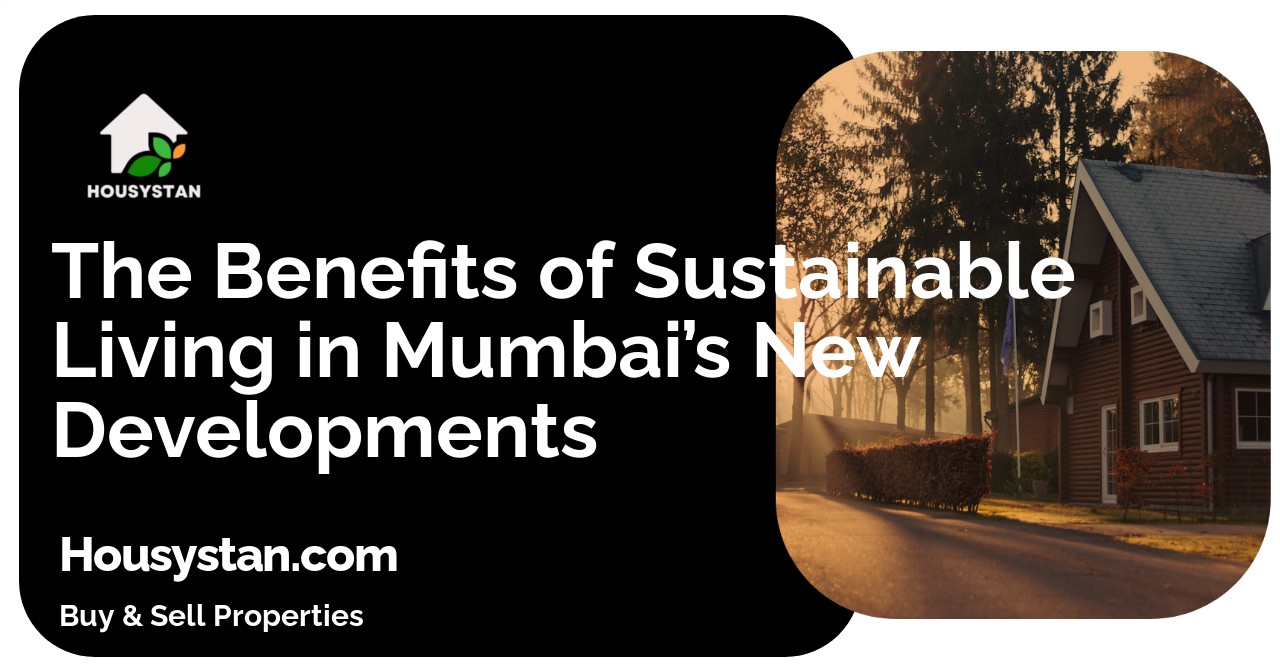The Benefits of Sustainable Living in Mumbai’s New Developments
Read latest blogs and articles from Housystan

The Information mentioned here was last updated on:
21/2/2026The Benefits of Sustainable Living in Mumbai’s New Developments
Introduction: Embracing a Greener Urban Future
Mumbai, a city often described as the heartbeat of India, is undergoing a quiet revolution. As urbanization accelerates and the population swells, the need for sustainable living in Mumbai’s new developments is more pressing than ever. Developers, policymakers, and residents are increasingly turning towards green building practices, eco-friendly amenities, and community-driven initiatives to create healthier, more resilient neighborhoods. This shift not only addresses environmental concerns but also enhances the quality of life for Mumbai’s citizens. Here’s a closer look at the multifaceted benefits sustainable living brings to the city’s latest residential and commercial projects.
- Verified Tenants/Buyers
- Unlimited Property Listing
- Zero subscription/charges fee
Understanding Sustainable Living in Mumbai
Sustainable living is more than a buzzword—it is a holistic approach that integrates environmental, social, and economic considerations into daily life. In the context of Mumbai’s new real estate developments, it involves resource-efficient construction techniques, renewable energy integration, efficient waste management, green open spaces, and community engagement. The city’s real estate industry is responding with a wave of eco-conscious housing complexes, commercial spaces, and mixed-use developments.
Environmental Benefits: Reducing the Urban Footprint
One of the primary advantages of sustainable living in Mumbai’s new developments is the significant reduction of the city’s ecological footprint. Green buildings utilize energy-efficient lighting, appliances, and HVAC systems, resulting in lower electricity consumption and reduced greenhouse gas emissions. Many new projects incorporate rainwater harvesting, solar panels, and greywater recycling, decreasing reliance on municipal utilities and conserving precious resources.
The presence of landscaped gardens, rooftop terraces, and green corridors not only improves air quality but also supports urban biodiversity. These green spaces act as natural carbon sinks, absorbing pollutants and offering a respite from the city’s noise and heat. By integrating native plant species, developers are able to create micro-ecosystems that thrive with minimal maintenance and water usage.
Economic Advantages: Long-Term Savings and Value
Sustainable living isn’t just good for the planet—it also makes economic sense. Green buildings in Mumbai often command higher property values and attract a growing segment of environmentally conscious buyers and tenants. Reduced energy and water bills translate into substantial long-term savings for residents and businesses alike. Developers are increasingly finding that investments in sustainability yield attractive returns, particularly as government incentives and certifications such as IGBC and LEED gain prominence.
Many eco-friendly projects offer facilities like electric vehicle charging stations, solar-powered common areas, and efficient waste segregation. These features not only cut operational costs but also future-proof properties against evolving regulations and market demands. For investors and homeowners, sustainable developments represent a secure, forward-thinking choice in an unpredictable real estate market.
Health and Wellbeing: Creating Happier Urban Communities
In a city as densely populated as Mumbai, access to clean air, green spaces, and healthy living conditions can be transformative. Sustainable developments prioritize natural lighting, ventilation, and non-toxic construction materials, leading to improved indoor air quality and overall wellbeing. Residents enjoy a closer connection to nature through community gardens, jogging tracks, and recreational zones.
The focus on open spaces and recreational amenities fosters a sense of community and encourages active lifestyles. Children benefit from safe play areas, while adults find opportunities for social interaction and relaxation. By reducing exposure to pollution and heat, sustainable buildings contribute to lower rates of respiratory illnesses and heat-related stress, making them ideal for families and senior citizens alike.
Social Impact: Building Inclusive and Connected Neighborhoods
Sustainable living in Mumbai’s new developments extends beyond physical infrastructure—it is about nurturing inclusive, resilient communities. Many projects are designed to be accessible to people of all ages and abilities, with features like ramps, elevators, and barrier-free pathways. Community centers, co-working spaces, and shared amenities promote social cohesion and foster a sense of belonging.
Initiatives such as community composting, recycling drives, and urban farming empower residents to participate in sustainability efforts. This collaborative approach not only strengthens neighborhood bonds but also cultivates a culture of environmental stewardship. Developers are increasingly partnering with local NGOs and civic organizations to ensure their projects serve as catalysts for positive change within Mumbai’s urban fabric.
Technological Innovations: Smart Solutions for a Sustainable City
The integration of smart technologies is accelerating the transition to sustainable living in Mumbai. From IoT-enabled energy management systems to real-time water monitoring and automated waste collection, technology is making it easier to track resource consumption and optimize efficiency. Mobile apps and digital platforms are helping residents stay informed, report issues, and participate in community initiatives.
Some developments are piloting advanced features such as green roofs, vertical gardens, and hydroponic farms, pushing the boundaries of urban sustainability. These innovations not only reduce environmental impact but also create new opportunities for education, employment, and entrepreneurship within the city.
Challenges and the Road Ahead
Despite the many benefits, the journey towards widespread sustainable living in Mumbai’s new developments is not without challenges. High initial costs, regulatory hurdles, and limited awareness can slow adoption rates. However, the growing demand for green housing, coupled with supportive government policies and incentives, is driving positive change. As more Mumbai residents experience the tangible benefits of sustainable living, the movement is expected to gain momentum.
Conclusion: The Promise of a Sustainable Mumbai
Sustainable living in Mumbai’s new developments is more than a trend—it is a necessity for the city’s future resilience and prosperity. By embracing eco-friendly construction, resource-efficient technologies, and community-centric design, Mumbai is setting an example for urban centers across India. The benefits—environmental, economic, social, and health-related—are too significant to ignore. As the city grows, so too does the promise of a cleaner, greener, and more inclusive Mumbai for generations to come.